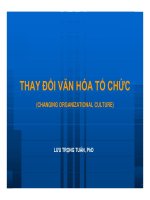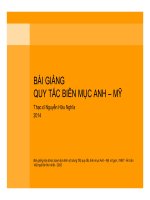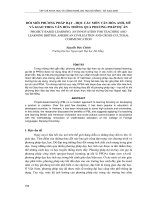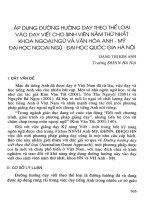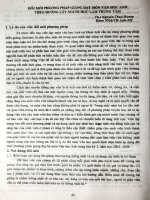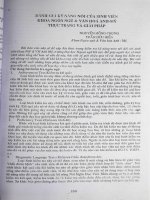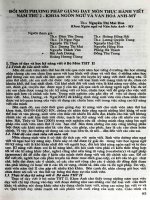BAI GIANG GOC MON VAN HOA ANH MY
Bạn đang xem bản rút gọn của tài liệu. Xem và tải ngay bản đầy đủ của tài liệu tại đây (6.69 MB, 215 trang )
PART ONE: ENGLISH CULTURE
CHAPTER 1: OVERVIEW
Reading 1: Country and people
Geographically speaking
Lying off the north-west coast of Europe, there are two large islands and several much smaller
ones. Collectively, they are known as the British Isles. The largest island is called Great Britain.
The other large one is called Ireland.
Politically speaking
In the British Isles there are two states. One of these governs most the island of Ireland. This
state is usually called The Republic of Ireland. It is also called ‘Eire’ (its Irish language name).
Informally it is referred to as just ‘Ireland’ or ‘the Republic’.
The other state has authority over the rest of the British Isles (the whole of Great Britain, the
northeastern area of Ireland and most of the smaller islands). Its official name is The United
Kingdom of Great Britain and Northern Ireland although it is usually known by a shorter name.
At the Eurovision Song Contest, at the United Nations and in the European Parliament, for
instance, it is referred to as ‘the United Kingdom’. In everyday speech this is often shortened to
‘the UK’. In other contexts it is referred to as ‘Great Britain’. This, for example, is the name you
hear when a gold medal winner steps onto the rostrum at the Olympic Games. The stickers on
cars (‘GB’) are another example of the use of this name. In writing and speaking that is not
especially formal or informal, the name ‘Britain’ is used. The normal adjective, when talking
about something to do with the UK, is ‘British’.
1
The four nations
People often refer to Britain by another name. They call it ‘England’. But this is not strictly
correct, and it can make some people angry. England is only one of the four nations of the
British Isles (England, Scotland, Wales and Ireland). Their political unification was a gradual
process that took several hundred years. It was completed in 1800 when the Irish parliament was
joined with the Parliament for England, Scotland and Wales in Westminster, so that the whole
of the British Isles became a single state- the United Kingdom of Great Britain and Ireland.
However, in 1922, most of Ireland became a separate state.
At one time the four nations were distinct from each other in almost ever aspect of life. In the
first place, they were different racially. The people in Ireland, Wales and highland Scotland
belonged to the Celtic race; those in England and lowland Scotland were mainly of Germanic
origin. This difference was reflected in the languages they spoke. People in the Celtic areas
spoke Celtic languages: Irish Gaelic, Scottish Gaelic and Welsh. People in the Germanic areas
2
spoke Germanic dialects (including the one which has developed into modern English). The
nations also tended to have different economic, social and legal systems.
Today these differences have become blurred. But they have not completely disappeared.
Although there is only one government for the whole of Britain, and people have the same
passport regardless of where in Britain they live, some aspects of government are organized
separately (and sometimes differently) in the four parts of the United Kingdom. Moreover,
Welsh, Scottish and Irish people feel their identity very strongly.
The dominance of England
There is, perhaps, an excuse for people who use the word ‘England’ when they mean ‘Britain’.
It cannot be denied that the dominant culture of Britain today is specifically English. The system
of politics that is used in all four nations today is of English origin and English id the main
language of all four nations. Many aspects of everyday life are organized according to English
custom and practice. But the political unification of Britain was not achieved by mutual
agreement. On the contrary, it happened because England was able to exert her economic and
military power over the other three nations.
Today English domination can be detected in the way in which various aspects of British public
life are described. For example, the supply of money in Britain is controlled by the Bank of
England (there is no such thing as a ‘Bank of Britain’). The present queen of the country is
universally known as ‘Elizabeth the Second’, even though Scotland and Northern Ireland have
never had an ‘Elizabeth the First’! (Elizabeth I of England and Wales ruled from 1553 to 1603.)
The term ‘Anglo’ is also commonly used. (The Angles were a Germanic tribe who settled in
England in the fifth century. The word ‘England’ is derived from their name.) For example,
newspapers and the television news talk about ‘Anglo-American relations’ to refer to relations
between the governments of Britain and the USA (and not just those between England and the
USA).
National loyalties
When you are talking to people from Britain, it is safest to use ‘Britain’ when talking about
where they live and ‘British’ as the adjective to describe their nationality. This way you will be
3
less likely to offend anyone. It is, of course, not wrong to talk about ‘people in England’ if that
is what you mean-people who live within the geographical boundaries of England. After all,
most British people live there. (►Populations in 1995). But it should always be remembered
that England does not make up the whole of the UK.
Populations in 1995
England
48.9 million
Scotland
5.1 million
Wales
2.9 million
Northern Ireland
UK total
1.6 million
58.6 million
These figures are estimates provided by the Government Actuary’s Department of the UK,
based on the 1991 Census. It is expected that the total population of Britain will continue to rise
by very small amounts until around the year 2025.
There has been a long history of migration from Scotland, Wales and Ireland to England. As a
result there are millions of people who live in England but who would never describe
themselves as English. They may have lived in England all their lives, but as far as they are
concerned they are Scottish or Welsh or Irish- even if, in the last case, they are citizens of
Britain and not of Eire. These people support the country of their parents or grandparents rather
than England in sporting contests. They would also, given the chance, play for that country
rather than England. If, for example, you had heard the members of the Republic of Ireland
World Cup football team talking in 1994, you would have heard several different kinds of
English accent and some Scottish accents, but only a few Irish accents. Most of the players did
not live in Ireland and were not brought up in Ireland. Nevertheless, most of them would never
have considered playing for any country other than Ireland!
The same holds true for the further millions of British citizens whose family origins lie outside
the British Isles altogether. People of Caribbean or south Asian descent, for instance, do not
mind being described as ‘British’ (many are proud of it), but many of them would not like to be
4
called ‘English’. And whenever the West Indian or Indian cricket team plays against England, it
is certainly not England that they support!
There is, in fact, a complicated division of loyalties among many people in Britain, and
especially in England. A black person whose family are from the Caribbean will passionately
support the West Indies when they play cricket against England. But the same person is quite
happy to support England just as passionately in a sport such as football, which the West Indies
do not play. A person whose family is from Ireland but who has always lived in England would
want Ireland to beat England at football but would want England to beat (for example) Italy just
as much. This crossover of loyalties can work the other way as well. English people do not
regard the Scottish, the Welsh or the Irish as ‘foreigners’ (or, at least, not as the same kind of
foreigners as other foreigners!). An English commentator of a sporting event in which a
Scottish, Irish or Welsh team is playing against a team from outside the British Isles tends to
identify with that team as if it were English.
A wonderful example of double identity was heard on the BBC during the Eurovision Song
Contest in 1992. The commentator for the BBC was Terry Wogan. Mr Wogan is an Irishman
who had become Britain’s most popular television talk-show host during the 1980s. Towards
the end of the program, with the voting for the songs nearly complete, it became clear that the
contest (in which European countries compete to present the best new popular song) was going
to be won by either Ireland or the United Kingdom. Within a five-minute period, Mr Wogan
could be heard using the pronouns ‘we’ and ‘us’ several times; sometimes he meant the UK and
sometimes he meant Ireland!
BRITISH CULTURE
5
CHAPTER 1: OVERVIEW
Reading 2: History
Prehistory
Two thousand years ago there was an Iron Age Celtic culture through-out the British Isles. It
seems that the Celts, who had been arriving from Europe from the eighth century BC onwards,
intermingled with the peoples who were already there. We know that religious sites that had
been built long before the arrival of the Celts continued to be used in the Celtic period.
For people in Britain today, the chief significance of the prehistoric period (for which no written
records exist) is its sense of my mystery. This sense finds its focus most easily in the astonishing
monumental architecture of this period, the remains of which exist throughout the country.
Wiltshire, in south-western England, has two spectacular, examples: Silbury Hill, the largest
burial mound in Europe, and Stonehenge (►Stonehenge and Silbury Hill ). Such places have a
special importance for anyone interested in the cultural and religious practices of prehistoric
Britain. We know very little about these practices, but there are some organizations today (for
example, the Order of bards, Ovates and Druids- a small group of eccentric intellectuals and
mystics) who base their beliefs on them.
Stonehenge
6
Silbury Hill
The Roman period (43-410)
The Roman province of Britannia covered most of present day England and Wales. The Romans
imposed their own way of life and culture, making use of the existing Celtic aristocracy to
govern and encouraging this ruling class to adopt Roman dress and the Roman language (Latin).
They exerted an influence, without actually governing there, over only the southern part of
Scotland. It was during this time that a Celtic tribe called the Scots migrated from Ireland to
Scotland, where they became allies of the Picts (another Celtic tribe and opponents of the
Romans. This division of the Celts into those who experienced direct Roman rule (the Britons in
England and Wales) and those who did not (the Gaels in Ireland and Scotland) may help to
explain the development of two distinct branches of the Celtic group of languages.
The remarkable thing about the Romans is that, despite their long occupation of Britain, they
left very little behind. To many other parts of Europe they bequeathed a system of law and
administration which forms the basis of the modern system and a language which developed
into the modern Romance family of languages. In Britain, they left neither. Moreover, most of
their villas, baths and temples, their impressive network of roads, and the cities they founded,
7
including Londinium (London), were soon destroyed or fell into disrepair. Almost the only
lasting reminder of their presence are place-names like Chester, Lancaster and Gloucester,
which include variants of the Roman word castra (a military camp).
The Germanic invasions (410-1066)
One reason why Roman Britannia disappeared so quickly is probably that its influence was
largely confined to the towns. In the countryside, where most people lived, farming methods had
remained unchanged and Celtic speech continued to be dominant.
The Roman occupation had been a matter of colonial control rather than large-scale settlement.
But, during the fifth century, a number of tribes from the north-western European mainland
invaded and settled in large numbers. Two of these tribes were the Angles and the Saxons.
These Anglo-Saxons soon had the south-east of the country in their grasp. In the west of the
country their advance was temporarily halted by an army of (Celtic) Britons under the command
of the legendary King Arthur (►King Arthur). Nevertheless, by the end of the sixth century,
they and their way of life predominated in nearly all of England and in parts of southern
Scotland. The Celtic Britons were either Saxonized or driven westwards, where their culture and
language survived in south-west Scotland, Wales and Cornwall.
►King Arthur
King Arthur provides a wonderful example of the distortions of popular history. In folklore and
myth he is a great English hero, and he and his knights of the round table are regarded as the
perfect example of medieval nobility and chivalry. In fact, he lived long before medieval times
and was a Romanized Celt trying to hold back the advances of the Anglo-Saxons- the very
people who became ‘the English’
The Anglo-Saxons had little use for towns and cities. But they had a great effect on the
countryside, where they introduced new farming methods and founded the thousands of selfsufficient villages which formed the basis of English society for the next thousand or so years.
The Anglo-Saxons were pagan when they came to Britain. Christianity spread throughout
Britain from different directions during the sixth and seventh centuries. It came directly from
8
Rome when St Augustine arrived in 597 and established his headquarters at Canterbury in the
south-east of England. It had already been introduced into Scotland and northern England from
Ireland, which had become Christian more than 150 years earlier. Although Roman Christianity
eventually took over the whole of the British Isles, the Celtic model persisted in Scotland and
Ireland for several hundred years. It was less centrally organized, and had less need for a strong
monarchy to support it. This partly explains why both secular and religious power in these two
countries continued to be both more locally based and less secure than it was elsewhere in
Britain throughout the medieval period.
Britain experienced another wave of Germanic invasions in the eighth century. These invaders,
known as Vikings, Norsemen or Danes, came from Scandinavia. In the ninth century they
conquered and settled the extreme north and west of Scotland, and also some coastal regions of
Ireland. Their conquest of England was halted when they were defeated by King Alfred of the
Saxon kingdom of Wessex (►King Alfred). This resulted in an agreement which divided
England between Wessex, in the south and west, and the ‘Danelaw’ in the north and east.
(►King Alfred)
9
King Alfred
King Alfred was not only an able warrior but also a dedicated scholar and a wise ruler. He is
known as ‘Alfred the Great’ – the only monarch in English history to be given this title. He is
also popularly known for the story of the burning of the cakes.
10
While Alfred was wandering around his country organizing resistance to the Viking invaders,
he traveled in disguise. On one occasion, he stopped at a woman’s house. The woman asked
him to watch some cakes that were cooking to see that they did not burn, while she went off to
get food. Alfred became lost in thought and the cakes burned. When the woman returned, she
shouted angrily at Alfred and sent him away. Alfred never told her that he was her king.
However, the cultural differences between Anglo-Saxons and Danes were comparatively small.
They led roughly the same way of life and spoke two varieties of the same Germanic tongue
(which combined to form the basis of modern English). Moreover, the Danes soon converted to
Christianity. These similarities made political unification easier, and by the end of the tenth
century England was one kingdom with a Germanic culture throughout. Most of modern-day
Scotland was also united by this time, at least in name, in a (Celtic) Gaelic kingdom.
The medieval period (1066-1485)
The successful Norman invasion of England in 1066 brought Britain into the mainstream of
western European culture. Previously most links had been with Scandinavia. Only in Scotland
did this link survive; the western isles (until the thirteenth century) and the northern islands
(until the fifteenth century) remaining under the control of Scandinavian kings. Throughout this
period the English kings also ruled over areas of land on the continent and were often at war
with the French kings in disputes over ownership.
Unlike the Germanic invasions, the Norman invasion was small scale. There was no such thing
as a Norman village or a Norman area of settlement. Instead, the Norman soldiers who had been
part of the invading army were given the ownership of land- and of the people living on it. A
strict feudal system was imposed. Great nobles, or barons, were responsible directly to the king;
lesser lords, each owing a village, were directly responsible to a baron. Under them were the
peasants, tied by a strict system of mutual duties and obligations to the local lord, and forbidden
to travel without hiss permission. The peasants were the English-speaking Saxons. The lords
and the barons were the French-speaking Normans. This was the beginning of the English class
system. (►Language and class)
►Language and class
11
The existence of two words for the larger farm animals in modern English is a result of the class
divisions established by the Norman conquest. There are the words for the living animals (e.g.
cow, pig, sheep), which have their origins in Anglo-Saxon, and the words for the meat from the
animals (e.g. beef, pork, mutton), which have their origins in the French language that the
Normans brought to England. Only Normans normally ate meat; the poor Anglo-Saxon
peasants did not!
The strong system of government which the Normans introduced meant that the Anglo-Norman
kingdom was easily the most powerful political force in the British Isles. Not surprisingly
therefore, the authority of the English monarch gradually extended to other parts of these islands
in the next 250 years. By the end of the thirteenth century, a large part of eastern Ireland was
controlled by Anglo-Norman lords in the name of the English king and the whole of Wales was
under his direct rule (at which time the custom of naming the monarch’s eldest son the ‘prince
of Wales’ began). Scotland managed to remain politically independent in the medieval period,
but was obliged to fight occasional wars to do so.
The cultural story of this period is different. Two hundred and fifty years after the Norman
Conquest, it was a Germanic language (Middle English) and not the Norman (French) language
which had become the dominant one in all classes of society in England. Furthermore, it was the
Anglo-Saxon concept of common law, and not Roman law, which formed the basis of the legal
system.
Despite English rule, northern and central Wales was never settled in great numbers by Saxon or
Norman. As a result the (Celtic) Welsh language and culture remained strong. Eisteddfods,
national festivals of Welsh song and poetry, continued throughout the medieval period and still
take place today. The Anglo-Norman lords of eastern Ireland remained loyal to the English king
but, despite laws to the contrary, mostly adopted the Gaelic language and customs.
The political independence of Scotland did not prevent a gradual switch to English language and
customs in the lowland (southern) part of the country. First, the Anglo-Saxon element here was
strengthened by the arrival of many Saxon aristocrats fleeing the Norman conquest of England.
Second, the Celtic kings saw that the adoption of an Anglo-Norman style of government would
12
strengthen royal power. By the end of this period a cultural split had developed between the
lowlands, where the way of life and language was similar to that in England, and the highlands,
where (Celtic) Gaelic culture and language prevailed- and where, because of the mountainous
landscape, the authority of the king was hard to enforce.
It was in this period that Parliament began its gradual evolution into the democratic body which
it is today. The word ‘parliament’, which comes from the French word parler (to speak), was
first used in England in the thirteenth century to describe an assembly of nobles called together
by king. In 1295, the Model parliament set the pattern for the future by including elected
representatives from urban and rural areas.
The sixteenth century
The power of the English monarch increased in this period. The strength of the great barons had
been greatly weakened by the Wars of the Rose (►The wars of the Roses). Bubonic plague
(known in England as the Black Death) contributed to the reduction of their power. It killed
about a third of the population in its first outbreak in England in the middle of the fourteenth
century and continued to reappear periodically for another 300 years. The shortage of labour
which this caused, and the increasing importance of trade in the towns, helped to weaken the
traditional ties between feudal lord and peasant.
►The wars of the Roses
During the fifteenth century the throne of England was claimed by representatives of two rival
groups. The power of the greatest nobles, who had their own private armies, meant that
constant challenges to the position of the monarch were possible. The Lancastrians, whose
symbol was a red rose, supported the descendants of the Duke of Lancaster, and the Yorkists,
whose symbol was a white rose, supported the descendants of the Duke of York. The struggle for
power led to the ‘Wars of the Roses’ between 1455 and 1485. They ended when Henry VII
defeated and killed Richard III at the Battle of Bosworth Field and were followed by an era of
stability and strong government which was welcomed by those weakened and impoverished by
decades of war.
The Tudor dynasty 91485-1603) established a system of government departments, staffed by
professionals who depended for the position on the monarch. As a result, the feudal barons were
13
no longer needed for implementing government policy. They were needed less for making
government policy. Parliament was traditionally split into two ‘Houses’. The House of Lords
consisted of the feudal aristocracy and the leaders of the Church; the House of Commons
consisted of representatives from the towns and the less important landowners in rural areas. It
was now more important for monarchs to get the agreement of the Commons for policy-making
because that was where the newly powerful merchants and landowners (the people with the
money) were represented.
Unlike in much of the rest of Europe, the direct cause of the rise of Protestantism in England
was political and personal rather than doctrinal (►Henry VIII). Henry VIII wanted a divorce
which the Pope would not give him. Also, by making himself head of the ‘Church of England’,
independent of Rome, all church lands came under his control and gave him a large new source
of income.
►Henry VIII
14
Henry VIII is one of the most well-known monarchs in English history, chiefly because he took
six wives during his life. It was during his reign that the Reformation took place. In the 1530s,
Henry used Parliament to pass laws which swept away the power of the Roman Church in
England. His quarrel with Rome was nothing to do with doctrine (it was because he wanted to
be free to marry again and to appoint who he wished as leaders of the Church in England). In
the same decade, he had a law passed which demanded complete adherence to Catholic belief
and practice. He had also previously written a polemic against Protestantism, for which the
pope gave him the title Fidei Defensor (Defender of the Faith). The initials FD still appear on
British coins today.
This rejection of the Roman Church accorded with a new spirit of patriotic confidence in
England. The country had finally lost any realistic confidence in England. The country had
finally lost any realistic claim to lands in France, thus becoming more consciously a distinct
‘island nation’. At the same time, increasing European exploration of the Americas and other
parts of the world meant that England was closer to the geographical centre of western
civilization instead of being, as previously, on the edge of it. It was in the last quarter of this
adventurous and optimistic century that Shakespeare began writing his famous plays.
It was therefore patriotism as much as religious conviction that had caused Protestantism to
become the majority religion in England by the end of the century. It took a form known as
Anglicanism, which was not so very different from Catholicism in its organization and ritual.
But in the lowlands of Scotland it took a more idealistic form. Calvinism, with its strict
insistence on simplicity and its dislike of ritual and celebration, became the dominant religion. It
is from this date that the stereotype of the dour, thrifty Scot developed. However, the Scottish
highlands remained Catholic and so further widened the gulf between the two parts of the
nation. Ireland also remained Catholic. There, Protestantism was identified with the English,
who at that time were making further attempts to control the whole of the country.
The seventeenth century
When James I became the first English king of the Stuart dynasty, he was already king of
Scotland, so the crowns of these two countries were united. Although their parliaments and
administrative and judicial systems continued to be separate, their linguistic differences were
lessened in this century. The kind of Middle English spoken in lowland Scotland had developed
15
into a written language known as ‘Scots’. However, the Scottish Protestant church adopted
English rather than Scots bibles. This, and the glamour of the English court where the king now
sat, caused modern English to become the written standard in Scotland as well.
In the sixteenth century religion and politics became inextricably linked. This link became even
more intense in the seventeenth century. At the beginning of the century, some people tried to
kill the king because he wasn’t Catholic enough. By the end of the century, another king had
been killed, partly because he seemed too Catholic, and yet another had been forced into exile
for the same reason.
This was the context in which, during the century, Parliament established its supremacy over the
monarchy in Britain. Anger grew in the country at the way that the Stuart monarchs raised
money, especially because they did not get the agreement of the House of Commons to do so
first. This was against ancient tradition. In addition, ideological Protestantism, especially
Puritanism, had grown in England. Puritans regarded many of the practices of the Anglican
Church, and also its hierarchical structure, as immoral. Some of them thought the luxurious
lifestyle of the king and his followers was immoral too. They were also fiercely anti-Catholic
and suspicious of the apparent sympathy towards Catholicism of the Stuart monarchs.
This conflict led to the Civil War (►The Civil War), which ended with complete victory for the
parliamentary forces. The king (Charles I) was captured and became the first monarch in Europe
to be executed after a formal trial for crimes against his people. The leader of the parliamentary
army, Oliver Cromwell, became ‘Lord Protector’ of a republic with a military government
which, after he had brutally crushed resistance in Ireland, effectively encompassed the whole of
the British Isles.
But when Cromwell died, he, his system of government, and the puritan ethics that went with it
(theatres and other forms of amusement had been banned) had become so unpopular that the son
of the executed king was asked to return and take the throne. The Anglican Church was
restored. However, the conflict between monarch and Parliament soon re-emerged. The
monarch, James II, tried to give full rights to Catholics, and to promote them in his government.
16
The ‘Glorious Revolution’ (‘glorious’ because it was bloodless) followed, in which Prince
William of Orange, ruler of the Netherlands, and his Stuart wife Mary, accepted Parliament’s
invitation to become king and queen. In this way it was established that a monarch could rule
only with the support of parliament. Parliament immediately drew up a Bill of Rights which
limited some of the powers of the monarch (notably, the power to dismiss judges). It also
allowed Dissenters (those who did not agree with the practices of Anglicanism) to practice their
religion freely. This meant that the Presbyterian Church, to which the majority of the lowland
Scottish belonged, was guaranteed its legality. However, Dissenters were not allowed to hold
government posts or be Members of Parliament.
James II, meanwhile, had fled to Ireland. But the Catholic Irish army he gathered there was
defeated. Laws were then passed forbidding Catholics to vote or even own land. In Ulster, in the
north of the country, large numbers of fiercely anti-Catholic Scottish Presbyterians settled (in
possession of all the land). The descendants of these people are still known today as Orangemen
(after their patron William of Orange). They form one half of the tragic split in society in
modern Northern Ireland, the other half being the ‘native’ Irish Catholics.
The eighteenth century
Politically, this century was stable. Monarch and Parliament got on quite well together. One
reason for this was that the monarch’s favorite politicians, through the royal power of patronage
(the ability to give people jobs), were able to control the election and voting habits of a large
number of Members of Parliament (MPs) in the House of Commons.
Within Parliament the divisions of the previous century, though far less bitter than before, were
echoed in the formation of two vaguely opposed loose collections of allies. One group, the
Whigs, were the political ‘descendants’ of the parliamentarians. They supported the Protestant
values of hard work and thrift, were sympathetic to Dissenters and believed in government by
monarch and aristocracy together. The other group, the Tories, had a greater respect for the idea
of the monarchy and the importance of the Anglican Church (and sometimes even a little
sympathy for Catholics and the Stuarts).
17
The two terms, Whig and Tory, had in fact first been used in the late 1670s and allegiance to
one side or the other was more often the result of family or regional loyalty than of political
beliefs. This could be said, however, to be the beginning of the party system in Britain.
The modern system of an annual budget drawn up by the monarch’s Treasury officials for the
approval of parliament was established during this century. So, too, was the habit of the
monarch appointing one principal, or ‘Prime’, Minister from the ranks of Parliament to head his
government.
At the beginning of the century, by agreement, the Scottish Parliament joined with the English
and Welsh parliament at Westminster in London. However, Scotland retained its own system of
law, more similar to continental European systems than to that of England. It does so to this day.
The only part of Britain to change radically as a result of political forces in this century was the
highlands area of Scotland. This are twice supported failed attempts to put a (Catholic) Stuart
monarch back on the throne by force. After the second attempt, many inhabitants of the
highlands were killed or sent away from Britain and the wearing of highland dress (the tartan
kilt) was banned. The Celtic way of life was effectively destroyed.
It was cultural change that was most marked in this century. Britain gradually expanded its
empire in the Americas, along the west African coast and in India. The increased trade which
resulted from the links with these new markets was one factor which led to the Industrial
Revolution. The many technical innovations in the areas of manufacturing and transport during
this period were also important contributing factors.
In England, the growth of the industrial mode of production, together with advances in
agriculture, caused the greatest upheaval in the pattern of everyday life since the Anglo-Saxon
invasions. Areas of common land, which had been available for use by everybody in a village
for the grazing of animals since Anglo-Saxon times, disappeared as landowners incorporated
them into their increasingly large and more efficient farms. (Some pieces of common land
remain in Britain today, used mainly as public parks. They are often called ‘the common’.)
Hundreds of thousands of people moved from rural areas into new towns and cities. Most of
these new towns and cities were in the north of England, where the raw materials for industry
18
were available. In this way, the north, which had previously been economically backward
compared to the south, became the industrial heartland of the country. The right conditions for
industrialization also existed in lowland Scotland and south Wales, which accentuated the
differences between those parts of these countries and their non-industrialized areas.
In the south of England, London came to dominate, not as an industrial centre but as a business
and trading centre. By the end of the century, it had a population close to a million.
Despite all the urban development, social power and prestige rested on the possession of land in
the countryside. The outward sign of this prestige was the ownership of a country seat- a
gracious country mansion with land attached. More than a thousand such mansions were built in
the eighteenth century.
The nineteenth century
Not long before this century began, Britain had lost its most important American colonies in a
war of independence. When the century began, the country was locked in a war with France,
during which an invasion by a French army was a real possibility. Soon after the end of the
century, Britain controlled the biggest empire the world had ever seen.
One section of this empire was Ireland. During this century it was, in fact, part of the UK itself,
and it was during this century that the British culture and way of life came to predominate in
Ireland. In the 1840s, the potato crop failed two years in a row and there was a terrible famine.
Millions of peasants, those with Irish Gaelic language and customs, either died or emigrated. By
the end of the century almost the whole of the remaining population were using English as their
first language.
Another part of the empire was made up of Canada, Australia and New Zealand, where settlers
from the British Isles formed the majority of the population. These countries had complete
internal self-government but recognized the overall authority of the British government.
Another was India, an enormous country with a culture more ancient than Britain’s. Tens of
thousands of British civil servants and troops were used to govern it. At the head of this
administration was a viceroy (governor) whose position within the country was similar to the
monarch’s in Britain itself. Because India was so far away, and the journey from Britain took so
19
long, these British officials spent most of their working lives there and so developed a distinctly
Anglo-Indian way of life. They imposed British institutions and methods of government on the
country, and returned to Britain when they retired. Large parts of Africa also belonged to the
empire. Except for South Africa, where there was some British settlement, most of Britain’s
African colonies started as trading bases on the coast, and were only incorporated into the
empire at the end of the century.
As well as these areas (Canada, Australia, New Zealand, India and Africa), the empire included
numerous smaller areas and islands. Some, such as those in the Caribbean, were the result of
earlier British settlement, but most were acquired because of their strategic position along
trading routes.
A change in attitude in Britain towards colonization during the nineteenth century gave new
encouragement to the empire builders. Previously, colonization had been seen as a matter of
settlement, of commerce, or of military strategy. The aim was simply to possess territory, but
not necessarily to govern it. By the end of the century, colonization was seen as matter of
destiny. There was an enormous increase in wealth during the century, so that Britain became
the world’s foremost economic power. This, together with long years of political stability
unequalled anywhere else in Europe, gave the British a sense of supreme confidence, even
arrogance, about their culture and civilization. The British came to see themselves as having a
duty to spread this culture and civilization around the world. Being the rulers of an empire was
therefore a matter of moral obligation. It was, in fact, known as ‘the white man’s burden’.
There were great changes in social structure. Most people now lived in towns and cities. They
no longer depended on country landowners for their living but rather on the owners of
industries. These factory owners held the real power in the country, along with the new and
growing middle class of tradespeople. As they established their power, so they established a set
of value which emphasized hard work, thrift, religious observance, family life, an awareness of
one’s duty, absolute honesty in public life and extreme respectability in sexual matters. This is
the set of values which we now call Victorian.
Middle-class religious conviction, together with a conscious belief that reform was better than
revolution, allowed reforms in political and public life to take place. Britain was gradually
20
turning into something resembling a modern state. There were not only political reforms, but
also reforms which recognized some human rights (as we now call them). Slavery and the laws
against people on the basis of religion were abolished, and laws were made to protect workers
from some of the worst forms of exploitation resulting from the industrial mode of production.
Public services such as the police force were set up.
Despite reform, the nature of the new industrial society forced many people to live and work in
very unpleasant conditions. Writers and intellectuals of this period either protested against the
horrors of this new style of life (as Dickens did) or simply ignored it. Many, especially the
Romantic poets, praised the beauties of the countryside and the simplicity of country life. This
was a new development. In previous centuries the countryside had just existed, and it wasn’t
something to be discussed or admired. But from this time on, most British people developed a
sentimental attachment to the idea of the countryside.
The twentieth century
By the beginning of this century, Britain was no longer the world’s richest country. Perhaps this
caused Victorian confidence in gradual reform to weaken. Whatever the reason, the first twenty
years of the century were a period of extremism in Britain. The Suffragettes, women demanding
the right to vote, were prepared both to damage property and to die for their beliefs; the problem
of Ulster in the north of Ireland led to disobey the government; and the government’s
introduction of new types and levels of taxation was opposed so absolutely by the House of
Lords that even parliament, the foundation of the political system, seemed to have an uncertain
future in its traditional form. But by the end of the First World War, two of these issues had
been resolved to most people’s satisfaction (the Irish problem remained) and the rather unBritish climate of extremism died out.
The significant changes that took place in the twentieth century are dealt with elsewhere in this
book. Just one thing should be noted here. It was from the beginning of this century that the
urban working class (the majority of the population) finally began to make its voice heard. In
Parliament, the Labour party gradually replaced the Liberals (the ‘descendants’ of the Whigs) as
the main opposition to the Conservatives (the ‘descendants’ of the Tories). In addition, trade
unions managed to organize themselves. In 1926, they were powerful enough to hold a General
21
Strike, and from the 1930s until the 1980s the Trades Union Congress was probably the single
most powerful political force outside the institutions of government and Parliament.
BRITISH CULTURE
CHAPTER 2: TRADITIONAL BELIEFS AND VALUES
Reading 1: Attitudes
The British, like the people of every country, tend to be attributed with certain characteristics
which are supposedly typical. However, it is best to be cautious about accepting such
characterizations too easily, and in the case of Britain there are three particular reasons to be
cautious. The first three sections of this chapter deal with them in turn and comment on several
stereotyped images of the British.
Stereotypes and change
Societies change over time while their reputations lag behind. Many things which are often
regarded as typically British derive from books, songs or plays which were written a long time
ago and which are no longer representative of modern life. One example of this is the population
belief that Britain is a ‘land of tradition’. This is what most tourist brochures claim (►Land of
tradition). The claim is based on what can be seen in public life and on centuries of political
continuity. And at this level- the level of public life- it is undoubtedly true. The annual
ceremony of the stage opening of Parliament, for example, carefully follows customs which are
centuries old. So does the military ceremony of ‘trooping the colour’. Likewise, the changing of
the guard outside Buckingham Palace never changes.
►Land of tradition
22
A reputation for tradition can lead to its artificial preservation – or even its re-introduction. A
notable example is the Asquith taxi. This was introduced onto the streets of London in 1994. It
is an exact replica of London taxis of the 1930s (except, of course, that it has modern facilities –
and a modern meter!). It is deliberately designed that way to appeal to tourists, who equate
London with tradition.
Similarly, when London’s famous red buses were privatized (sold to private companies) in the
early 1990s, the different bus companies wanted to paint their buses in their company colours.
The government ruled that all buses had to stay red because that is what the people of London
wanted, and that is what the government believed would help the tourist trade.
An Asquith taxi
However, in their private everyday lives, the British as individuals are probably less inclined to
follow tradition than are the people of most other countries. There are very few ancient customs
that are followed by the majority of families on special occasions. The country has fewer local
parades or processions with genuine folk roots than most other countries have. The English
language has fewer saying or proverbs that are in common everyday use than many other
languages do. The British are too individualistic for these things. In addition, it should be noted
that they are the most enthusiastic video-watching people in the world- the very opposite of a
traditional pastime!
23
There are many examples of supposedly typical British habits which are simply not typical any
more. For example, the stereotyped image of the London ‘city gent’ included the wearing of a
bowler hat. In fact, this type of hat has not been commonly worn for a long time. Food and drink
provide other examples. The traditional ‘British’ (or ‘English’) breakfast is a large ‘fry-up’
preceded by cereal with milk and followed by toast, butter and marmalade, all washed down
with lots of tea. In fact, only about 10% of the people in Britain actually have the cereal, tea and
toast. The rest have even less. What the vast majority of British people have in the mornings is
therefore much closer to what they call a ‘continental’ (i.e. European) breakfast than it is to a
‘British’ one. The image of the British as a nation of tea-drinkers is another stereotype which is
somewhat out of date. It is true that it is still prepared in a distinctive way (strong and with
milk), but more coffee than tea is now bought in the country’s shops. As for the tradition of
afternoon tea with biscuits, scones, sandwiches or cake, this is minority activity, largely
confined to retired people and the leisured upper-middle class (although preserved in tea shops
in tourist resorts).
Even when a British habit conforms to the stereotype, the wrong conclusions can sometimes be
drawn from it. The supposed British love of queuing is an example. Yes, British people do form
queues whenever they are waiting for something, but this does not mean that they enjoy it. In
1992, a survey found that the average wait to pay in a British supermarket was three minutes
and twenty-three seconds, and that the average wait to be served in a bank was two minutes and
thirty-three seconds. You might think that these times sound very reasonable. But The Sunday
Times newspaper did not think so. It referred to these figures as a ‘problem’. Some banks now
promise to serve their customers ‘within two minutes’. It would therefore seem wrong to
conclude that their habit of queuing shows that the British are a patient people. Apparently, the
British hate having to wait and have less patience than people in many other countries.
Multiculturalism
The third reason for caution about generalizations relates to the large scale immigration to
Britain from places outside the British Isles in the twentieth century. In its cities at least, Britain
is a multicultural society. There are areas of London, for example, in which a distinctively
Indian way of life predominates, with Indian shops, Indian clothes, Indian languages. Because in
24
the local schools up to 90% of the pupils may be Indian, a distinctively Indian style of learning
tends to take place.
These ‘new British’ people have brought widely differing sets of attitudes with them. For
example, while some seem to care no more about education for their children than people in
traditional English culture, others seem to care about it a great deal more.
However, the divergence from indigenous British attitudes in new British communities is
constantly narrowing. These communities sometimes have their own newspapers but none have
their own TV stations as they do in the United States. There, the numbers in such communities
are larger and the physical space between them and other communities is greater, so that it is
possible for people to live their whole lives in such communities without ever really learning
English. This hardly ever happens in Britain.
It is therefore still possible to talk about British characteristics in general (as the rest of this
chapter does). In fact, the new British have made their own contribution to British life and
attitudes. They have probably helped to make people more informal; they have changed the
nature of the ‘corner shop’; the most popular, well-attended festival in the whole of Britain is
the annual Notting Hill Carnival in London at the end of August, which is of Caribbean
inspiration and origin.
Conservatism
The British have few living folk traditions and are too individualistic to have the same everyday
habits as each other. However, this does not mean that they like change. They don’t. They may
not behave in traditional ways, but they like symbols of tradition and stability. For example,
there are some very untraditional attitudes and habits with regard to the family in modern
Britain. Nevertheless, politicians often cite their enthusiasm for ‘traditional family values’ (both
parents married and living together, parents as the main source of authority for children etc) as a
way of winning support.
In general, the British value continuity over modernity for its own sake. They do not consider it
especially smart to live in a new house and, in fact, there is prestige in living in an obviously old
one. They have a general sentimental attachment to older, supposedly safer, times. Their
25



